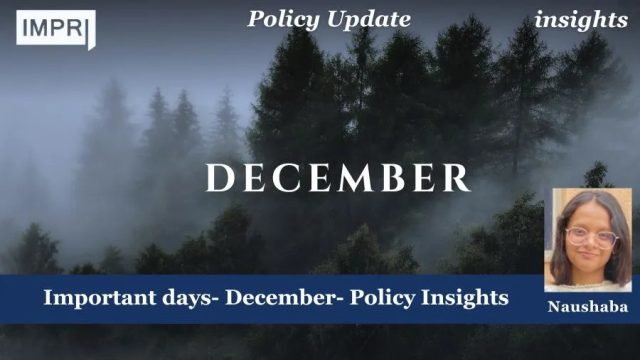Policy Update
Naushaba
December, the final month of the year, carries a profound sense of reflection, celebration, and global awareness. As the holiday season approaches, this month is marked by a diverse array of international and national observances, each day dedicated to raising awareness, promoting human rights, and fostering unity across various aspects of life. From recognising the importance of human solidarity to advocating for environmental conservation and social justice, December offers a unique opportunity to reflect on the years past while encouraging collective action toward a better future.
World AIDS Day was first observed in 1988, by the World Health Organisation (WHO) and the United Nations to raise global awareness about the AIDS epidemic, commemorate those who have lost their lives to the disease, and support those living with HIV. It was the first-ever global health day, marking a significant milestone in the fight against the stigma associated with HIV/AIDS.
The day serves as an opportunity to reflect on the progress made in medical treatments and prevention strategies while highlighting the challenges that remain. In recent years, there has been a push to achieve UN Sustainable Development Goal 3.3, which seeks to end the AIDS epidemic by 2030. Recent campaigns have emphasised reducing inequalities in access to HIV treatments, particularly in low-income countries, and ensuring comprehensive care for vulnerable populations such as the LGBTQ+ community.
December 2 – World Computer Literacy Day
World Computer Literacy Day was launched by the National Institute of Information Technology (NIIT), an Indian computer training company, in 2001. The day was created to bridge the digital divide and raise awareness about the importance of computer literacy, particularly among women and those in developing regions. As technology plays an ever-increasing role in modern life, this day has become more relevant than ever. Recent efforts have focused on expanding digital education, especially in rural areas, to promote technological skills and create opportunities in today’s digital economy.
December 2 – International Day for the Abolition of Slavery
Established by the United Nations in 1986, the International Day for the Abolition of Slavery is observed annually to raise awareness about the ongoing struggles to eradicate all forms of slavery, including human trafficking, forced labour, and child exploitation. The day is grounded in the UN’s broader mission to protect human rights. Modern forms of slavery affect over 40 million people worldwide. Recent initiatives have centered on addressing human trafficking in conflict zones and improving global cooperation to combat this hidden crisis.
December 2 – National Pollution Control Day
National Pollution Control Day is observed annually in India to honour the victims of the Bhopal Gas Tragedy, which occurred on this date in 1984. The Bhopal Gas Tragedy, which occurred on December 2-3, 1984, in Bhopal, India, was a catastrophic industrial disaster that resulted in the release of methyl isocyanate gas from the Union Carbide pesticide plant, leading to thousands of deaths and long-term health impacts on the local population.
The day underscores the importance of pollution control and environmental protection to prevent such disasters from happening again. With rising concerns over air pollution in Indian cities, particularly Delhi, recent initiatives have called for stricter environmental regulations, promotion of clean technologies, and greater public awareness of pollution’s impact on health.
December 3 – International Day of People with Disabilities & World Day of the Handicapped
The International Day of People with Disabilities was proclaimed by the United Nations in 1992 to promote the rights and well-being of people with disabilities across all spheres of society and development. The day seeks to increase awareness of the challenges faced by the 1 billion people living with disabilities globally and to advocate for more inclusive and accessible societies. Recent campaigns have focused on technological innovations that enable greater accessibility, such as assistive devices, and efforts to create inclusive workplaces and public services.
December 3 – World Conservation Day
World Conservation Day is observed to highlight the importance of protecting natural resources and promoting sustainable environmental practices. While the exact date of its establishment is unclear, its significance has grown in the context of climate change and environmental degradation. In recent years, attention has been focused on preserving biodiversity and reducing carbon footprints through collective global action, especially after the COP26 summit, which stressed the urgency of conservation efforts to meet global climate goals.
Navy Day in India is celebrated on December 4 each year to honour the role and achievements of the Indian Navy in defending the nation’s maritime borders. The day commemorates Operation Trident, the 1971 Indo-Pakistani War operation in which the Indian Navy played a critical role in the destruction of the Pakistani Navy’s base in Karachi. Navy Day highlights the Navy’s strategic importance in safeguarding India’s vast coastline and its interests in the Indo-Pacific region. In recent times, there has been a strong focus on modernising the Indian Navy, enhancing its capabilities to address evolving security challenges, including piracy, terrorism, and international conflicts in the maritime domain.
December 5 – International Volunteer Day for Economic and Social Development
Established by the United Nations in 1985 to celebrate the dedication and contributions of volunteers worldwide in promoting economic and social development. It acknowledges the invaluable efforts of volunteers in areas like disaster relief, health care, education, and environmental conservation. Recent volunteer movements, especially during the COVID-19 pandemic, have demonstrated the power of community-driven action in supporting healthcare systems, delivering essential services, and helping vulnerable populations.
Founded by the Food and Agriculture Organisation (FAO) and recognised by the UN General Assembly in 2013, the day aims to raise awareness about the importance of healthy soils for sustaining agriculture, supporting ecosystems, and promoting food security. With over 33% of the Earth’s soils degraded due to unsustainable farming practices, climate change, and deforestation, recent global efforts have focused on soil restoration, encouraging sustainable agriculture, and combating soil erosion and desertification.
December 7 – Armed Forces Flag Day
Armed Forces Flag Day has been observed in India since 1949 and is dedicated to honouring the soldiers, sailors, and airmen of the Indian Armed Forces. The day is marked by the collection of funds for the welfare of ex-servicemen and their families, especially those disabled or martyred in the line of duty. In recent years, there has been a greater push for the modernisation of the Indian military and better welfare schemes for veterans, including health care and pension reforms.
December 7 – International Civil Aviation Day
Established by the International Civil Aviation Organisation (ICAO) in 1994 to recognise the role of aviation in connecting the world and fostering global development. Civil aviation is crucial for economic growth, tourism, and global trade. Recent discussions have focused on the recovery of the aviation industry from the impacts of the COVID-19 pandemic, the adoption of sustainable aviation fuels, and addressing the environmental impact of air travel.
December 9 – International Day Against Corruption
International Day Against Corruption was introduced by the United Nations in 2003 following the adoption of the UN Convention Against Corruption. The day is dedicated to raising awareness about the detrimental effects of corruption on economic development, governance, and social justice. Corruption continues to hinder progress in many parts of the world, diverting funds meant for infrastructure, healthcare, and education. Recent global initiatives have emphasised the importance of transparency, good governance, and international cooperation to tackle corruption, particularly in times of crisis, such as the misuse of funds during the pandemic.
December 10 – Human Rights Day
Celebrated annually on December 10 to mark the adoption of the Universal Declaration of Human Rights (UDHR) by the United Nations General Assembly in 1948. The UDHR is a cornerstone document that articulates the fundamental rights and freedoms to which every human being is entitled. Human Rights Day serves as a reminder to uphold these rights and protect the vulnerable. Recent conversations around this day have focused on racial justice, climate change, and gender equality, highlighting the need for a global commitment to human dignity and equality for all.
December 11 – International Mountain Day
International Mountain Day was declared by the United Nations General Assembly in 2003 to emphasise the need for sustainable development in mountain regions and the preservation of mountain ecosystems. Mountains provide 60-80% of the world’s fresh water and are home to 15% of the global population, making them critical to both human life and biodiversity. In recent years, this day has focused on the growing impact of climate change on mountains, with glaciers retreating, ecosystems degrading, and mountain communities becoming more vulnerable to natural disasters.
December 14 – International Energy Day
This day is an important global observance that promotes the significance of sustainable and renewable energy sources for the future of the planet. With increasing concerns over climate change and the depletion of fossil fuels, this day calls for innovation in clean energy solutions, energy efficiency, and responsible energy consumption. Recent events have centered around the efforts to transition to renewable energy, such as the use of wind and solar power, and the push for net-zero emissions to combat global warming.
Vijay Diwas is celebrated on December 16 each year in India to commemorate the country’s victory over Pakistan in the 1971 Indo-Pakistani War, that led to the creation of Bangladesh. The day honours the bravery and sacrifice of the Indian Armed Forces and marks the surrender of over 93,000 Pakistani troops, the largest military surrender since World War II. The recent focus of Vijay Diwas has been on remembering the geopolitical significance of this victory and ensuring continued diplomatic and strategic ties with Bangladesh.
December 18 – International Migrants Day
Established by the United Nations in 2000 to recognise the contributions of migrants to both their host and home countries and to advocate for the protection of their rights. With over 280 million people living outside their country of origin, migrants play a crucial role in the global economy. In recent years, the focus has been on the vulnerability of migrants due to conflicts, climate change, and xenophobia. There have been renewed efforts to support safe migration pathways and improve the conditions of migrants globally.
December 18 – Minorities Rights Day in India
Minorities Rights Day in India is observed annually on December 18 and highlights the need to protect the rights and freedoms of minority groups in the country. The day emphasises the Indian Constitution’s commitment to ensuring equality and safeguarding cultural diversity. Recent discussions have centered on addressing issues of religious and linguistic minorities in India and ensuring their social and political inclusion in an increasingly polarised environment. In the current context of Minorities Rights Day under the Modi government, discussions have intensified around the impact of policies like the Citizenship Amendment Act (CAA) and the revocation of Article 370 in Kashmir, with concerns raised about the marginalisation of religious minorities, particularly Muslims.
December 19 – Goa’s Liberation Day
Goa’s Liberation Day marks the day in 1961 when the state of Goa was liberated from Portuguese colonial rule after over 450 years. The Indian Army conducted Operation Vijay to annex Goa, bringing it under Indian control. The day is celebrated with great pride and serves as a reminder of the fight against colonialism. Recent events focus on the rich cultural heritage of Goa and discussions about the state’s development as a global tourist destination.
December 20 – International Human Solidarity Day
International Human Solidarity Day was proclaimed by the United Nations General Assembly in 2005 as a day to celebrate unity in diversity and to remind governments of their commitments to international agreements, particularly in the fight against poverty. The day promotes solidarity as a key component of addressing global challenges, especially in the context of SDGs. In recent years, solidarity has been a central theme in addressing global crises such as the COVID-19 pandemic and climate change, emphasising the need for collective action to achieve sustainable development.
December 22 – National Mathematics Day
National Mathematics Day in India is celebrated in honour of Srinivasa Ramanujan, one of India’s greatest mathematicians, whose contributions to number theory, continued fractions, and infinite series are celebrated worldwide. The day was declared in 2012 by the Government of India to promote interest in mathematics and encourage young students to pursue careers in this field. Recent events have focused on Ramanujan’s legacy and the importance of mathematics in today’s world, especially in areas like data science, artificial intelligence, and space exploration.
December 23 – Kisan Divas (Farmer’s Day)
Kisan Divas is observed annually on December 23 to honour Chaudhary Charan Singh, India’s fifth Prime Minister, who was a champion of farmers’ rights and agricultural reforms. The day serves as a reminder of the critical role that farmers play in ensuring food security and the economic backbone of the country. Recent debates have revolved around issues such as the impact of climate change on farming, the need for sustainable agriculture practices, and the recent farmer protests against controversial agricultural laws in India.
December 24 – National Consumers Day
National Consumers Day in India commemorates the Consumer Protection Act of 1986, which was enacted to provide consumers with legal protection against unfair trade practices and exploitation. The day raises awareness about consumer rights and the responsibilities of businesses to ensure fair trade. In the digital age, the focus has shifted towards protecting consumers in e-commerce, safeguarding data privacy, and ensuring transparency in online transactions. Recent discussions emphasise the growing importance of consumer awareness in the digital economy, especially in the wake of increasing cyber fraud.
December 25 – Christmas Day
Christmas commemorates the birth of Jesus Christ and is celebrated by Christians worldwide. The day has both religious and secular significance, marked by traditions such as attending church services, exchanging gifts, and spending time with family. Over the years, Christmas has come to symbolise peace, charity, and goodwill, with various charitable efforts aimed at helping those in need during the holiday season. In recent times, there has been a focus on eco-friendly Christmas practices, encouraging sustainable celebrations to minimise environmental impact during the festive season.
In conclusion, December serves as a powerful reminder of the values we hold dear and the global challenges we face. The observances throughout this month not only highlight the importance of social, environmental, and humanitarian issues but also inspire us to take action in our communities and beyond. As we celebrate these days, let us embrace the spirit of solidarity, compassion, and commitment to creating a more just and equitable world which can contribute to a brighter future for all and carry the lessons learned into the new year ahead.
About the Contributor– Naushaba (she/her/hers) is a research intern at the Impact and Policy Research Institute and a postgraduate student of the Academy of International Studies, Jamia Millia Islamia. Her research interests lie in Global Politics, Gender Studies, Climate Change and Sustainable Development.
Acknowledgment- The author would like to thank Ishita Deb and Meenu Mohan in successful completion of his article.
Read more at IMPRI:
Important Days- November- Policy Insights
An Analysis of Deendayal Upadhyay Grameen Kaushal Yojana- 2019



















